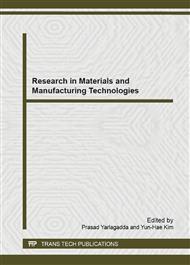[1]
Satty T L. The Analytic Hierarchy Process. McGraw Hill Inc. NY, (1980).
Google Scholar
[2]
Mareschal B. Weight stability intervals in multi-criteriadecision [J]. European Journal of Operational Research, 1998, (33): 54-64.
Google Scholar
[3]
Zhongjun Wang. Multiobjective Weight Assigning Methods and Their Choice Strategies[J]. Systems Engineering and Electronics, 1993, 06: 35-41+34. In Chinese.
Google Scholar
[4]
Johanna M. Harte, Pieter Koele and Gijsbert van Engelenburg. Estimation of attribute weight in a multi-attribute choice situation[J]. Acta Psychological, (1996).
DOI: 10.1016/0001-6918(96)00021-2
Google Scholar
[5]
Weixian WEI, Jia Feng. Study on Multiobjective Weight Combination Assigning Method[J]. Systems Engineering and Electronics, 1998, 02: 15-17. In Chinese.
Google Scholar
[6]
F. Herrera, L. Martinez, P.J. Sanchez. Managing non-homogeneous information in group decision making[J]. European Journal of Operational Research, 2005, 166: 115-132.
DOI: 10.1016/j.ejor.2003.11.031
Google Scholar
[7]
Xindong Wu, Fanlun Xiong. A learning model for weight coefficients in multi-objective evaluation[J]. Information and Control, 1988, 06: 1-5. In Chinese.
Google Scholar
[8]
Zhiping Fan, Quan Zhang, Jian Ma. An Integrated Approach to Determining Weight in Multiple Attribute Decision Making[J]. Journal of Manegement Sciences in China, 1998, (3): 50-53. In Chinese.
Google Scholar
[9]
Zeshui Xu, Qingli Da. Study on Method of Combination Weighting[J]. Chinese Journal of Management Science, 2002, (2): 84-87. In Chinese.
Google Scholar
[10]
Xiuying Cao, Jingguo Liang. The Method of Ascertaining Attribute Weight Based on Rough Sets Theory[J]. Chinese Journal of Management Science, 2002, (5): 98-100. In Chinese.
Google Scholar
[11]
Yufeng Zhou, Fajie Wei. The Method for Determining the Posterior Weight of Expert Based on Fuzzy Judgment Matrices[J]. Chinese Journal of Management Science, 2006, (3): 71-75. In Chinese.
Google Scholar
[12]
Chuanmin Mi, Sifeng Liu, Yaoguo Dang, Zhigeng Fang. Study on grey entropy weight clustering decision-making[J]. Systems Engineering and Electronics, 2006, 28(12): 1823-1844. In Chinese.
DOI: 10.1109/wcica.2006.1713206
Google Scholar
[13]
Yanhua Fu. A Weighted Averaging Method Based on Overall Weight of Discounted Evidences[J]. Journal of Northeastern University(Natural Science), 2010, 07: 917-920. In Chinese.
Google Scholar
[14]
Jie Cui, Yaoguo Dang, Sifeng Liu. An Improved Approach for Determining Weight of Attributes in Decision Making Based on Grey incidence[J]. Chinese Journal of Management Science, 2008, 05: 141-145. In Chinese.
Google Scholar
[15]
Yanbin Du, Huajun Cao, Fei Liu, Ping Yan, LI Congbo. Evaluation of machine tool remanufacturing scheme based on entropy weight and AHP[J]. Computer Integrated Manufacturing Systems, 2011, 17(1): 84-88. In Chinese.
Google Scholar


